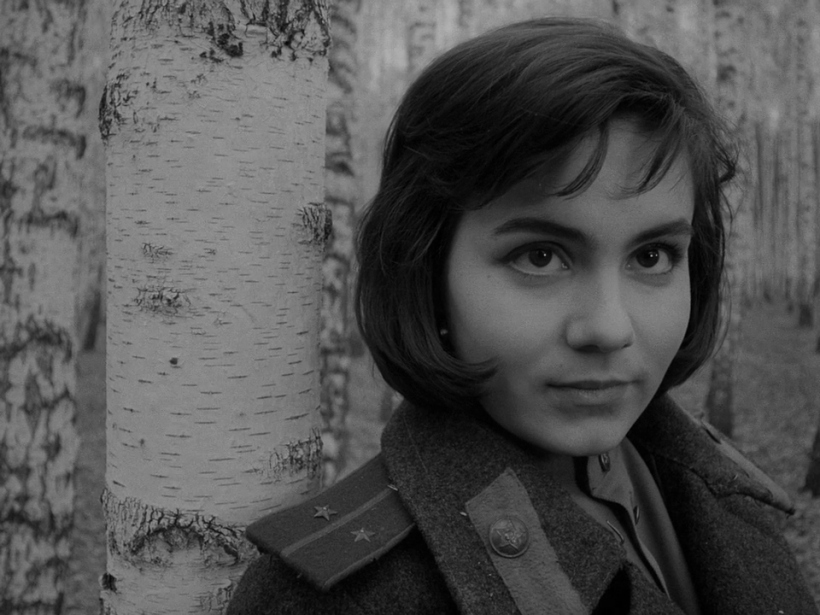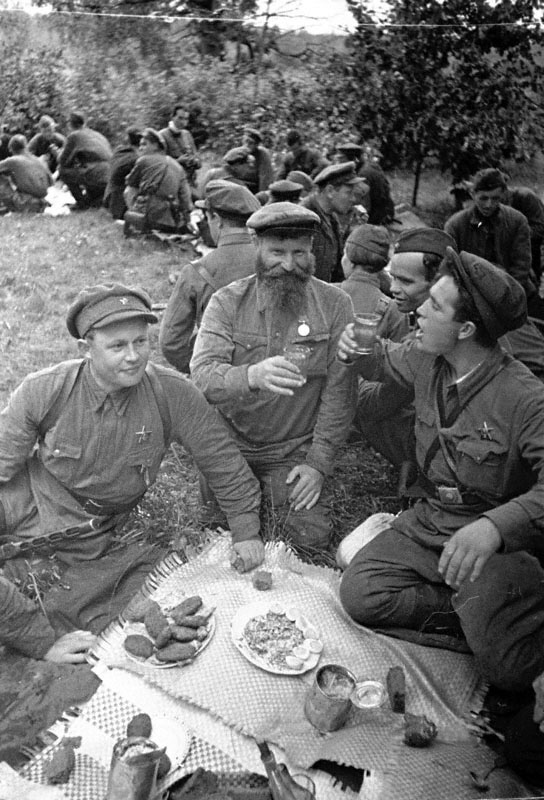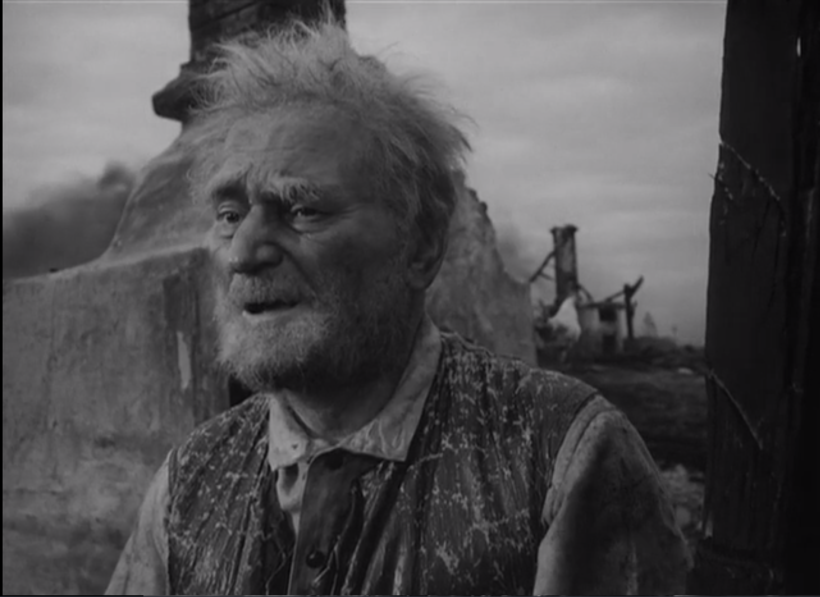
Andrei Tarkovsky’s 1962 debut film, Ivan’s Childhood (available on Kanopy), follows a 12 year old boy serving as a scout in the Soviet military during World War II. Although it was made a couple decades after the war, this film not only portrays the mental and physical destruction wrought by the war, but also raises fascinating questions about Soviet military life.
Fan-edited trailer for Ivan’s Childhood by David McBryde
The first thing I wondered about as I watched this movie was the role of children in the Soviet military. In the film, Ivan states that he has lost all of his family – his mother was killed by a German soldier. Ivan serves as a scout, using his small size and presumed innocence to obtain information behind enemy lines. Although Ivan’s Childhood is a fictional film, this does not appear far from the truth.
Many children served in the Red Army – estimates range from 60,000 to 300,000. Some served voluntarily, but some were conscripted. A number of children were used in mine-sweeping operations1 after areas had been liberated. Most of the children who served on the front lines of battle did so by choice. They felt the same sense of patriotism and duty that Ivan exhibits in the film. Like Ivan, many of these children were orphans; they often referred to the soldiers2 as “papa.” They were picked up by the army as it liberated areas along the eastern front, and many were eventually legally adopted by officers.
That children served in the Red Army is interesting because it is rarely mentioned. It seems to be a fairly taboo subject, as there is little literature or information from official sources on the topic. There could be several reasons for this – not only was the necessity of children a sign of how bad the war was, but it’s also painful to think that children had to see such atrocities – many, therefore, would rather forget this.
Pictures of child soldiers in the Red Army – video by Youtube user Doppelganger Todd.
Another subject the film briefly mentions is the treatment of women in the Soviet military. Masha, a nurse in the Red Army, is continuously doubted by one of the officers (Galtsev). He even says that “war is a man’s business, it’s not for girls.” Several accounts3 by female Soviet soldiers affirm the prevalence of this attitude among their male peers. Nonetheless, at least 500,000 women served in the Red Army in World War II. Many all-female regiments were formed, the most famous of which became known as the “night witches,” for their nighttime bombings.
In the film, Masha faces another obstacle – unwanted attention from a male officer (Kholin). In one scene, the officer takes her into a secluded area of a forest, where he forcibly kisses her (it’s very much a “because of the implication” scenario). This, too, was not an uncommon occurrence for women in the Soviet military. Two women, Irina Bogacheva and Iuliia Zhukova, specifically wrote of sexually predatory instances in their memoirs.4

Valentina Malyavina as Masha in Ivan’s Childhood. IMDb.
One group mentioned throughout the film were the partisans. Although the state took credit for their formation, the partisans were generally grassroots movements in enemy-held territories that fought against the Germans. Many sprung up in Belorussian forests as well as Ukraine. By late 1943, there were at least 500,000 partisans. While the state lionized them, they often faced resistance from anti-Soviet locals. In addition, food and supplies were scarce. At the end of the war, some partisans felt abandoned by the state, and became part of an independence movement in Ukraine.

Partisans near Leningrad. Seventeen Moments in Soviet History
More than anything, however, this film depicts the soul-crushing destruction wrought upon Russia by World War II. The film opens with Ivan in a field, laughing at butterflies and playing, as a child should. However, this turns out to be a dream – Ivan wakes up and resumes his role as a patriotic, no-nonsense soldier. This contrast of what childhood should be to Ivan’s violent reality perfectly conveys the war’s effect on Russia for years to come. The loss of at least 15% of their population meant that no citizen was untouched by the war’s ravages. Families were destroyed, and those who lived through the war were permanently changed. Tarkovsky’s film communicates all of this in a visually stunning but haunting manner.

“Pelageya will be back soon. That’s my old lady’s name.” – A villager in the movie says to this Ivan as he wanders around the ruins of his village. Screenshotted by me from Kanopy.

Notes
- Pg. 2.
- Pg. 153.
- Pg. 170.
- Pg. 418.
Your post is so interesting! I had no idea that so many women and children took part in the Red Army. You are right that almost no one mentions the use of child soldiers and especially orphans by the red army as scouts and other positions. Also the hardships that women in the Red Army faced, even though they were all on the same side they were still viewed negatively by their male counterparts. Very informative and interesting post!
LikeLiked by 1 person
Thank you!! Yeah, I thought the hardships women faced in the army were interesting and unfortunately still relevant to many workplaces today.
LikeLike
I enjoyed every word of this! I think your analysis hits lots of the key (and easily overlooked) points about gender and childhood in war. I’m so glad you found Ivan’s Childhood on Kanopy! We can talk more in class, but one of the reasons this film is so unusual and important is because it does not romanticize war. Ivan’s childhood is about loss and terrible sacrifice. This was a bitter message for postwar cinema audiences — one they weren’t really ready for — too close to home! (Check out some other Soviet war movies from the time and you’ll see what I mean).
LikeLiked by 1 person
Thanks! I did read somewhere that Tarkovsky hated war and that this was his antiwar film – I wanted to mention it but didn’t find any super-reliable sources about it. I can definitely see why postwar audiences might have been uncomfortable with it! It’s very gritty and real.
LikeLike
I want to say that I am very interested in watching Ivan’s Childhood now. As deplorable as using child soldiers is, it is a testament to how desperate the war was for the Soviet Union. I am really interested to see how the partisans are depicted in the film. In History of WWII, we learned that Germany issued very harsh punitive actions against partisans and the people who supported them. Great post!
LikeLiked by 1 person
I’d highly recommend watching it! While the partisans aren’t really shown, they are mentioned often by Ivan and the officers.
LikeLike
I really like the how you incorporate various films into your posts. This really bring the material to life and presents it in a way that is unique. I never knew about the child soldiers that were utilized – this was really shocking to me. Keep up the great work!
LikeLiked by 1 person
Thank you! I really like movies, so watching new ones and writing about film for my posts is really fun.
LikeLike
Great post, and so well written and informative, I really like how you include links in the text–you will have to show me how to do that. I guess the Russians were ahead of their time in regards to anti-war sentiment.
LikeLike
Thanks! Tarkovsky, at the very least, was ahead of his time. He was born in 1932, so he would have been about Ivan’s age during the worst times of the war – I’m guessing that had a profound effect on him.
LikeLike